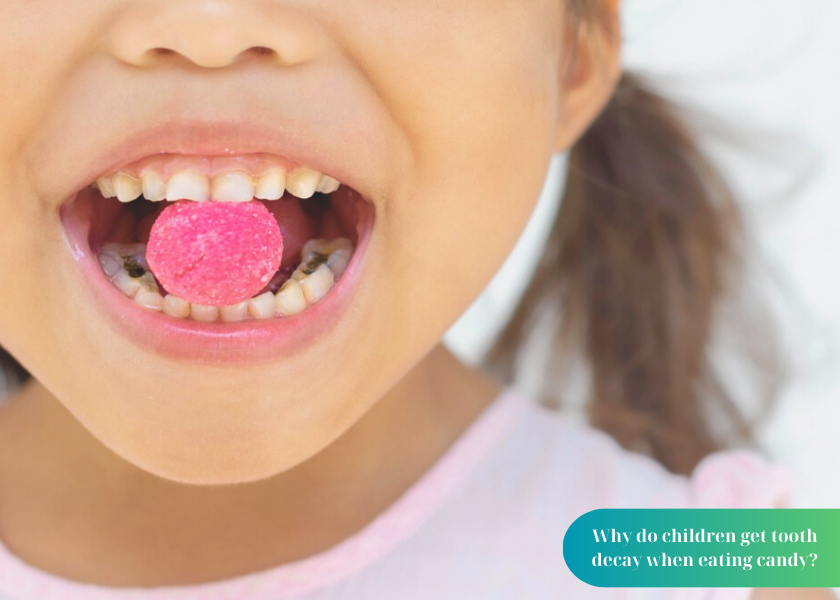Why do children get tooth decay from eating candy?: When we eat sweets and do not clean our teeth properly, our teeth are very susceptible to cavities. There are many opinions that eating candy causes cavities. So is this true? Follow the article below to better understand the causes of cavities when children eat candy.
Tư vấn chuyên môn bài viết:
BÁC SĨ DƯƠNG THỊ THÙY NGA
What is tooth decay?
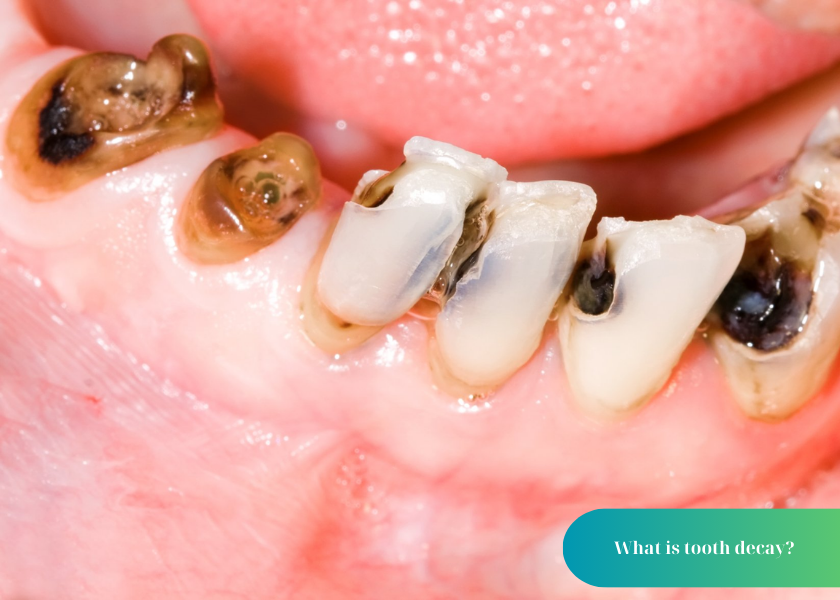
Tooth decay occurs when bacteria penetrate the enamel, destroying the tooth pulp and causing pain. If not treated promptly, tooth decay will become more serious, causing larger cavities and can lead to pulpitis and tooth necrosis. In the next stage, bacteria will penetrate the tooth root, and if not treated early, bacteria can enter the bloodstream and cause blood poisoning.
The bacteria that cause tooth decay are mainly Streptococcus. When starch and sugar stick to the teeth, they form white plaques. These plaques rub against bacteria, turning into acids that erode tooth enamel, causing tooth decay, especially when children eat candy without cleaning their teeth thoroughly.
See more: Braces for children and 5+ things parents need to know
Why does eating candy cause tooth decay?
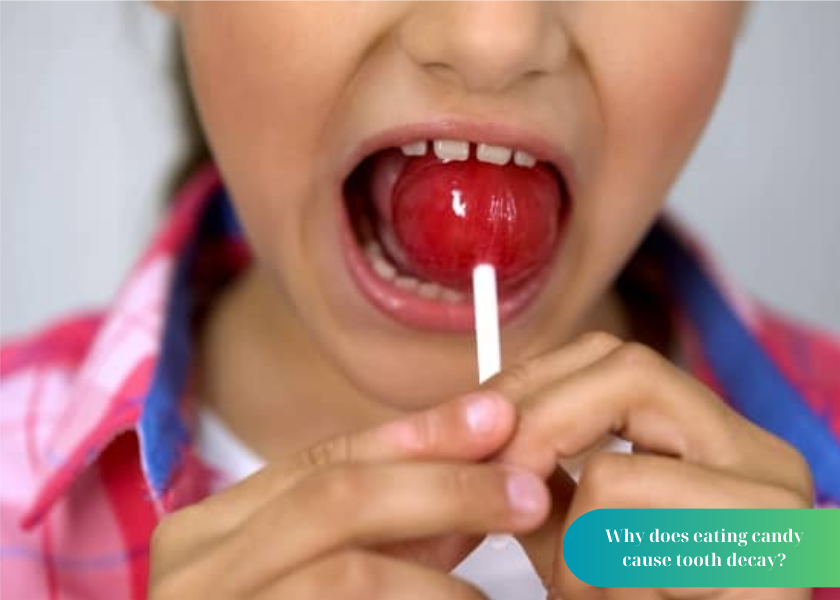
Fast foods such as cookies and candy contain high sugar content, which is harmful to the body if consumed regularly. Candies such as gummies, cookies, and wafers all contain a lot of sugar. Sugar in candy and drinks does not directly cause tooth decay, but is a factor that can lead to tooth decay.
Streptococcus bacteria come into contact with sugary plaque from candy and sweet foods, turning them into acids that destroy tooth enamel, causing teeth to wear down and form small holes.
When chewing candy, new plaque will form due to bacteria and saliva. This plaque builds up over time, the bacteria in it erodes the teeth and creates tiny holes in the teeth, the early stage of tooth decay.
Plaque is now a mixture of acids, so strong that it can erode from the enamel to the dentin, then spread to the pulp. The pulp contains blood vessels and nerves, so when the pulp is inflamed, you will feel severe pain, which can spread to the ear or head. The jawbone and teeth are also numb and painful.
Not only candy, other products with high sugar content also contribute to tooth decay. Sugar in candy easily sticks to the teeth and is difficult to wash away, creating an opportunity for bacteria to damage tooth enamel. Foods such as ice cream or cheese can be easily washed away with water, but hard candy or lozenges often get stuck in the teeth, difficult to dissolve completely.
See more: 12 safe and effective ways to treat tooth decay at home
Why do children get tooth decay when eating candy?
When children are young, the structure of the teeth and jawbone is not fully developed, the dentin layer is very soft and weak. If not cleaned well, children’s teeth will be susceptible to decay. Here are some reasons why children get cavities from chewing gum:
Improper brushing
Children are often instructed by their parents or teachers on how to brush their teeth. However, if children do not take care of their teeth properly or do not brush their teeth twice a day, bacteria will easily grow and cause cavities.
Impact from pregnant mothers
If the mother has cavities during pregnancy, this can affect the baby’s calcium absorption, causing the baby’s teeth to be thinner and more susceptible to bacteria.
Eating candy causes cavities
There are many types of bacteria on the surface of the teeth that cannot be seen with the naked eye. Foods containing high sugar content such as sucrose, glucose, fructose, and maltose, when consumed in the stomach, bacteria in the mouth will convert them into acid. This acid destroys tooth enamel and causes cavities.
Foods containing sugar and starch
Foods containing sugar or starch such as cereals and flour can also cause cavities. If after eating these foods, children’s teeth are not cleaned properly, they are susceptible to tooth decay.
Is it dangerous for children to have tooth decay when eating candy?
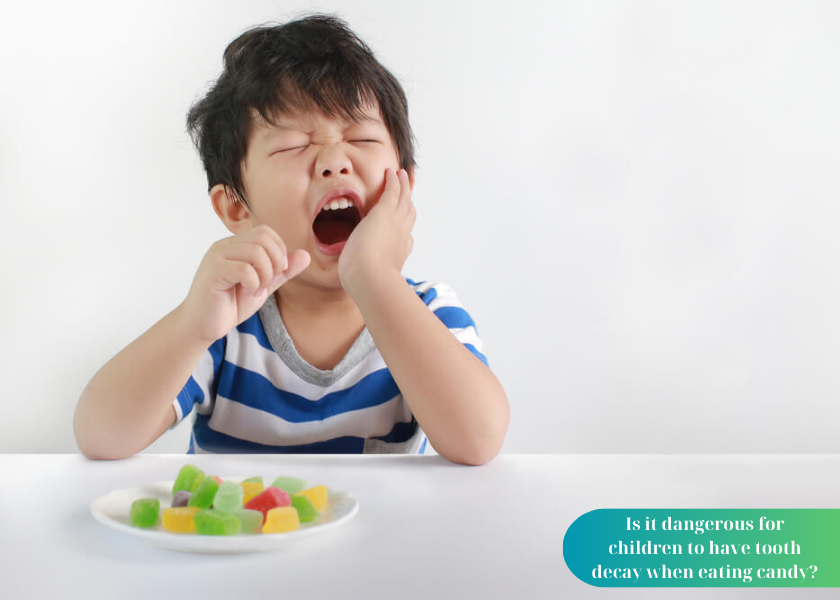
Tooth decay is a fairly common condition in infants, causing many parents to think that this is a simple problem and does not have serious consequences. However, experts confirm that tooth decay is a very dangerous disease for infants, with many serious consequences as follows:
- Tooth decay causes prolonged pain and fatigue, causing children to lose sleep, lose appetite, and be lazy to eat. This affects the normal development of children.
- Tooth decay can lead to malformed tooth structure. When teeth grow too early or unevenly, children may experience jaw bone loss, affecting the development of the teeth.
- Tooth decay can lead to serious complications such as tooth abscesses and gingivitis. In severe cases, it can threaten the child’s life.
- Tooth decay makes teeth ugly, causing loss of aesthetics and affecting the child’s future life.
5 ways to treat tooth decay in children due to eating candy
When chewing gum for a long time causes tooth decay, you can reduce the pain at home with folk remedies. However, the best way to treat it completely is to go to a dental facility to treat tooth decay.
BeamDental encourages you to see a dentist as soon as you detect tooth decay, especially when it has not been completely treated. This will help prevent tooth decay from spreading to the pulp, making treatment difficult and affecting aesthetics.
Folk methods
To treat tooth decay with traditional methods, you need to make sure to clean all ingredients before using. This will help prevent tooth decay from becoming more serious or avoid food poisoning. Here are some methods:
- Rinse with salt water
Salt water has antiseptic and pain-relieving properties. You can use warm salt water for your child to rinse his mouth instead of pre-mixed salt water. Remind your child not to swallow the salt water but to spit it out. The ideal time to rinse your mouth with salt water is after bathing, in the morning when waking up, and before going to bed.
- Use warm lemon water
Lemon water contains acid, which has the effect of disinfecting, relieving pain and preventing the development of tooth decay. However, you should not use fresh lemon water many times a day because the acid can erode tooth enamel. To relieve pain, you can rub warm lemon water on the cavity. Drinking diluted warm lemon water also helps strengthen teeth and prevent tooth decay.
- Use garlic and basil

Garlic and basil are effective in treating toothache. Crush garlic and basil, then apply it to the tooth surface and the toothache. You can also squeeze the garlic juice and apply it to the damaged tooth. This method effectively relieves pain, but garlic and basil have a pungent smell, so let your child come into contact with the smell before using.
- Treat tooth decay with chives
Chives are effective in treating tooth decay and bad breath. Grind chives, then rub on teeth to relieve pain for a few minutes.
Dental methods
Whether it is an adult or a baby, tooth decay cannot be completely treated without going to the dentist. If you use home treatments but the pain does not go away, you should see a dentist for appropriate treatment instructions. Below are common treatments depending on the severity of tooth decay from mild to severe:
- Using antibiotics
When tooth decay has just begun, small holes appear or the cavity is just beginning, the dentist can use a cavity treatment cream to apply to the affected area. This method helps eliminate tooth decay and relieve pain.
- Tooth filling
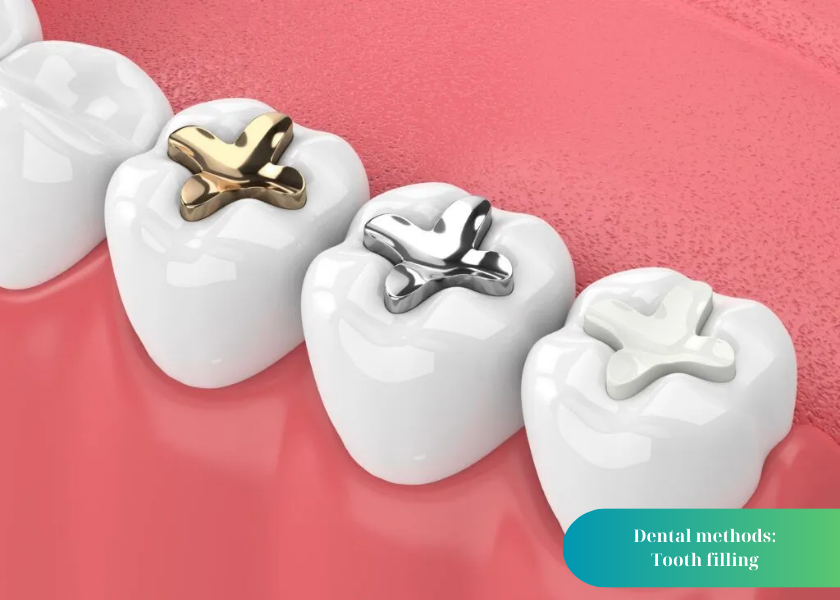
When the tooth is more severely damaged, has large black patches or gaps but has not invaded and destroyed the tooth pulp, the dentist can apply the tooth filling method. The filling material will be selected depending on your financial conditions.
- Tooth extraction
When tooth decay has affected the bone marrow and the tooth tip, other treatment methods will be difficult to be effective. If bacteria penetrate the pulp but the entire tooth has not been damaged, the dentist will perform a root canal and fill the tooth permanently with a porcelain crown. In cases where the tooth cannot be saved, tooth extraction is necessary. After extracting a damaged tooth, you should fill the gap to help the jawbone grow straight and not break.
See more: 6+ effective ways to treat tooth decay
3 ways to prevent tooth decay in children
Eating a lot of candy can cause tooth decay, especially in young children, leading to many negative health effects. Here are some ways to help you and your child avoid tooth decay caused by eating candy:
Clean your teeth
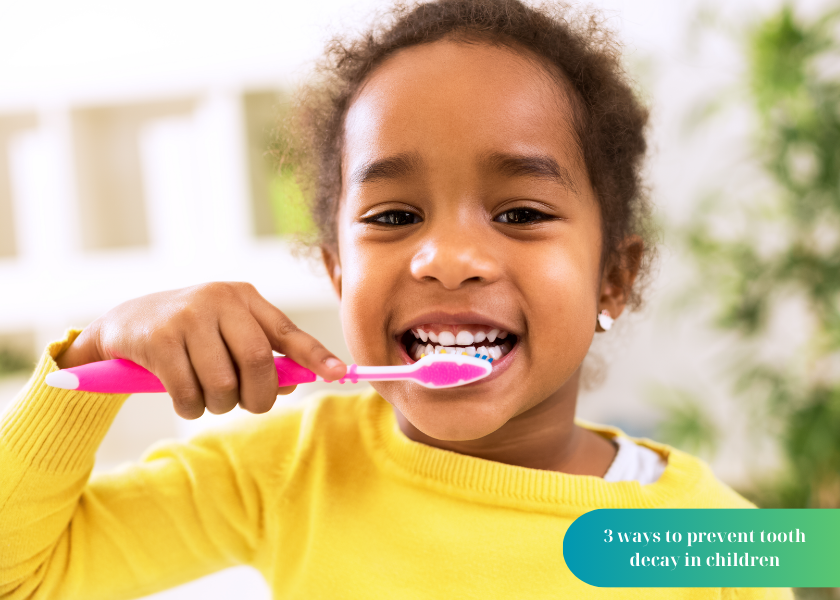
- Guide children to brush their teeth properly: Teach children how to brush their teeth to remove plaque and leftover food.
- Choose the right toothbrush: Use a soft-bristled toothbrush and one specifically designed for young children.
- Use toothpaste with fluoride and calcium: Helps kill bacteria that cause tooth decay.
- Rinse with salt water: After brushing, have your child rinse his mouth with salt water to fight inflammation and disinfect.
Establish healthy eating habits
- Avoid foods with a lot of chemicals: Limit your child’s intake of candy, cakes and foods with a lot of chemicals.
- Supplement vitamins: Provide your child with vitamins from foods that are good for teeth such as milk and fruit juice.
- Foods rich in calcium and vitamin D3: Give your child foods rich in calcium and vitamin D3 to keep teeth strong.
Regular dental check-ups
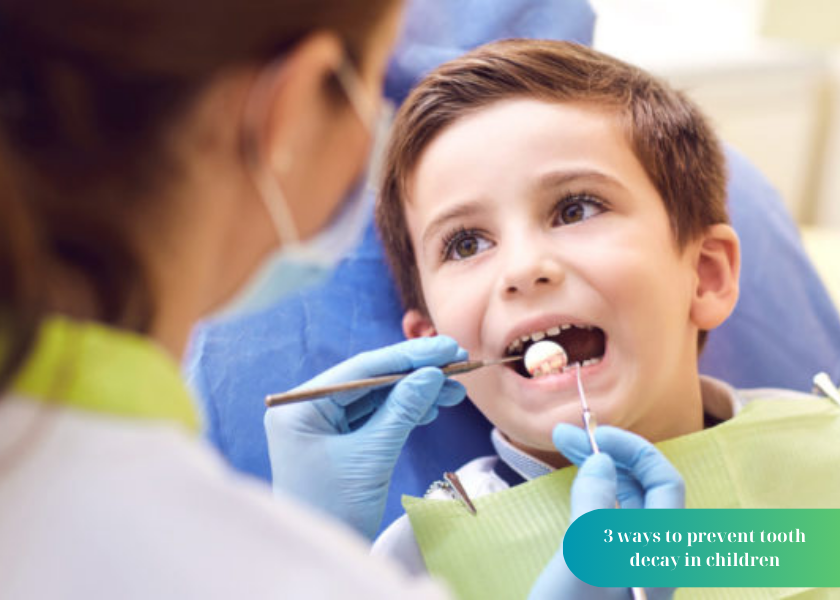
Take your child to the dentist regularly for check-ups and early detection of signs of tooth decay. The doctor will provide timely treatment and help you save costs.
Hopefully the useful information in the above article has helped you answer the question of Why do children get tooth decay when they eat candy?. If you have any other questions, you can contact BeamDental directly for a free consultation.
See more: Experience in identifying types of dental bridges and 7+ things you need to know
BEAMDENTAL – HỆ THỐNG NHA KHOA TIÊU CHUẨN HÀNG ĐẦU
CHI NHÁNH HÀ NỘI
CS1: 7B Thi Sách, Ngô Thì Nhậm, Hai Bà Trưng, Hà Nội - 0934.61.9090
CS2: 98C Chiến Thắng, Văn Quán, Hà Đông - 0934.61.9090
CHI NHÁNH TP.HỒ CHÍ MINH (HCM)
56 Nguyễn Đình Chiểu, Đa Kao, Quận 1, Tp.Hồ Chí Minh - 0766.00.8080
GIỜ HOẠT ĐỘNG:
09h00 – 21h00. Tất cả các ngày trong tuần
Link web: beamdental.com.vn

